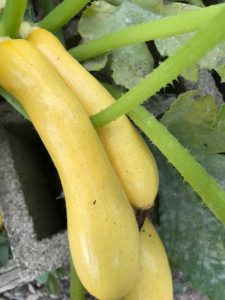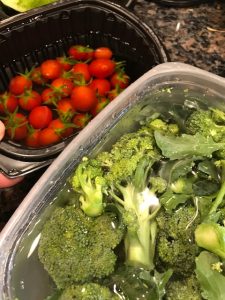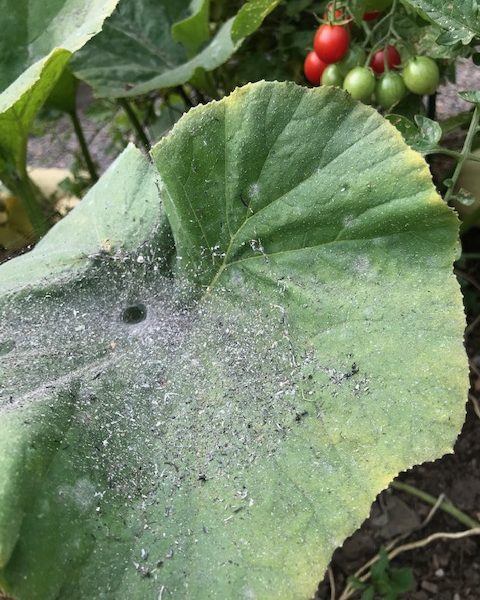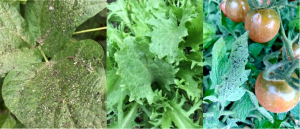Cover photo: squash plant ash accumulation in backyard garden in Corvallis (staff photo)
Ash accumulations on bean plant leaves, lettuce, and tomato plants (photos courtesy of Eating Rainbow Garden Coop, Corvallis)
Greetings, Conscientious Food Consumers!
The skies have finally begun to clear during this second week of horrific and historic wildfires in northwest Oregon, but evacuations continue and the extent of the destruction of lives, property and natural resources has yet to be assessed as this edition of Kitchen Confessions is published. NFLB staff joins everyone in witnessing and mourning the tragic consequences of the massive wildfires raging in Oregon, throughout our region, and in our neighboring states.
Here in the mid-Willamette Valley, the menacing orange and brown hue overhead is gone, and our local Air Quality Index has finally begun to incrementally improve — from “Hazardous” or “Very Unhealthy,” to merely “Unhealthy.”
The losses to Oregon’s agricultural industry are likely to be catastrophic. Backyard gardeners and larger-scale farmers alike lost more than a week of tending and harvest time. Both the Corvallis-Albany Farmers’ Markets and the South Town Farm Stand and Market had to take a week off.
At Midway Farms near Albany, owner/farmer Cynthia Kapple says her primary losses resulted from consecutive days of hazardous air quality that kept her and her employees from harvesting which left crops rotting in fields, and, the continuous smoke haze blocking out sunlight. That meant her strawberries could not properly sweeten up, her chickens were stressed and stopped laying, and even her cow was coughing. Cynthia’s concord grapes took on the smoke flavor – no telling yet whether this will affect the taste of the jelly.
Local farmers need everyone’s support now more than ever!
After watching the local AQI closely for a week, my neighbor and I donned our N95 face masks to see how well his garden held up under the continuous blanketing of smoke and hazardous ash.
The verdict: surprisingly well, despite noticeable deposits of the powdery-gritty fallout and the extreme de-humidification from the massive fires in our neighboring counties.
Whether you have a garden or not, it’s now important to thoroughly inspect, rinse, re-wash (and dry if not preparing immediately) and carefully prepare produce that has been exposed to the hazardous residues of the wildfires’ destruction.
Once again, we turn to the experts at the OSU Extension Service for advice on dealing with smoke- and ash-tainted produce. While smoke and ash can definitely ruin the quality of some crops, that exposure is not necessarily a food safety issue unless the skin of the fruit or vegetable has been broken — allowing for contamination by toxic particulates and residues.
However, unless you’re part of a direct-to-consumer or commercial produce business, it’s a matter of personal judgment whether to simply cut out the damaged portions and make use of the rest, or to dispose of the whole item or batch. In my case, I harvested two pints of cherry tomatoes, but ended up composting nearly a whole pint with cracked skins. Sometimes food does have to be left behind…
My remaining tomatoes, squash and a batch of broccoli were treated with a 10% vinegar rinse (see photos) — which gave me peace of mind as well as the satisfaction of consuming something I freshly harvested myself! Pizzas and omelets are the perfect match for these garden rescues — so noted on this week’s Meal Planner.


Light ash accumulation on yellow squash; cherry tomatoes and broccoli in separate containers with vinegar water rinse. (Staff photos)
Especially during times of emergency, food can get left behind. But as we prepare for the winter of 2020 under the shadow of both COVID-19 and the devastation of wildfire, let’s make the most of what remains available to us. Our food is more valuable now than ever!



 No Questions Left Behind (ok, a few)
No Questions Left Behind (ok, a few)